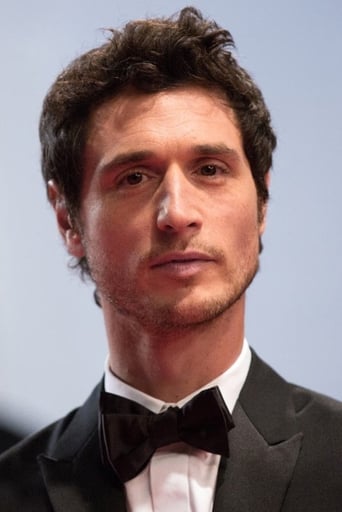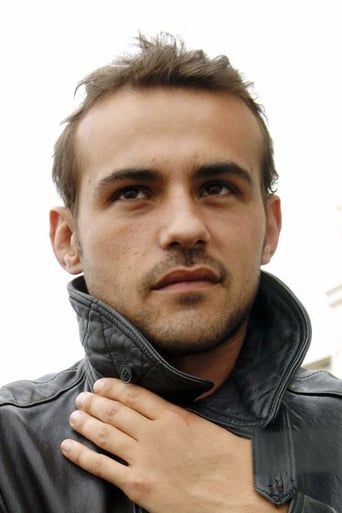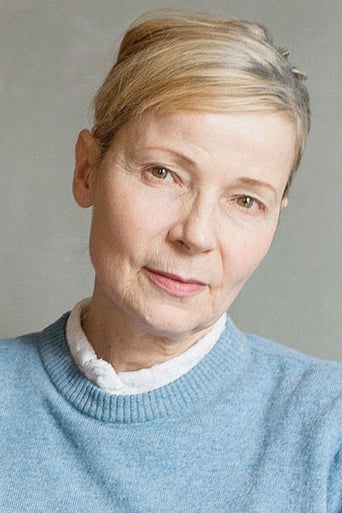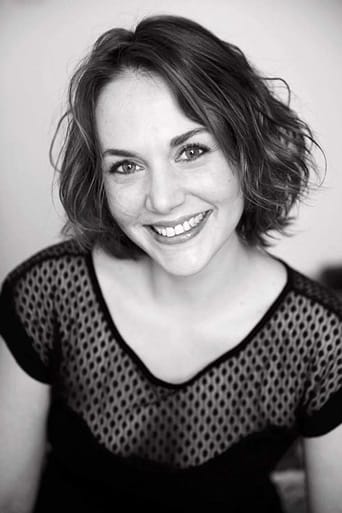Hellen
I like the storyline of this show,it attract me so much
Cubussoli
Very very predictable, including the post credit scene !!!
Bea Swanson
This film is so real. It treats its characters with so much care and sensitivity.
Curt
Watching it is like watching the spectacle of a class clown at their best: you laugh at their jokes, instigate their defiance, and "ooooh" when they get in trouble.
AaronMendozaJr
Presque Rien (Come Undone) is a beautifully misunderstood film. A lot of people hate this movie because they don't understand it and find the ending pointless. However, you need to watch it maybe a few more times to understand it. At least watching it once more will convince you that this movie is amazing and better than what you first believed. The acting and characters are all great. The story is split up into three parts and they're not in order but once you piece it all together, you get something that could have inspired Charlie Kaufman in his work. Every time I watch this movie, I learn something new about who I am. The ending is what really made a lot of people hate this movie because people argue that the film just ends. To me there are two endings, but a more depressing ending is the right ending. I think it ends in an endless loop of heart- breaking because we see familiar things over and over again (that's not a spoiler). I think upon further evaluation and analysis, you'll see there's a lot more to this film than meets the eye. If you want to hear my own interpretations and explanations, please refer to this video series: https://youtu.be/Y2lVNPL1G4g? list=PL6w77gLrP1Erb7BW_i6D0RdiZAiwwVonM
Imhotep77
I agree that the movie is a little slow at spots having many scenes of mundane everyday life and no dialog. And I wasn't impressed right after I watched it. However, after a few days, I realized that the movie stays with me and it evokes a melancholy mood which lingers in my mind. My appreciation of this movie increases. It certainly merits a higher consideration than those movies that are instantly forgettable.As many have commented, the movie is non-linear and that's a hallmark of European film-making as opposed to the linear narrative form that Hollywood favors. I don't really know whether it's true or not. Many also dislike its confusing structure and lack of clear explanations. To those viewers, I don't think there is much I can say to change their opinions. However, for others who have yet to see the film, DO expect to be challenged and DON'T expect the film to supply all the answers and you might come away enjoying it more than you would otherwise.The movie skips around a bit but really chronicles just 3 time periods. Pay attention to the hair style and you can easily separate out 2 of the 3 periods. It is also not as confusing as suggested; just enjoy and it'll all be clear at the end.Yes, lots of things are left unsaid or not shown, and lots of situations are left unexplored. But isn't that what life is like? A lot of time you're not sure of the motives of your friends/loved ones unless you confront them and even then, you can never be 100% sure if they told you the whole truth. This type of movies forces us to interpret the reasons behind the actions. The movie does, however, leave enough hints for you to make some reasonable assumptions. For example, Mathieu is manic depressive, to the point of suicidal. Why? I don't know, maybe his life is not turning out exactly as he expects it; maybe he misses his family but hasn't forgiven his father for abandoning his sick mother at her hours of need; maybe after all he sacrifices for Cedric, rearranging and indeed, shattering his life to be with him, he realizes that it is all "coming undone". I think the director meant to show us that he has always been a little off, mentality fragile by that scene w/ the dead bird. Maybe he has a very sensitive psyche and all these stresses are taking a toll on him. But we're also shown that he is not some animal torturing psycho by his loving interaction w/ the stray cat. Also, there is one conversation between the doctor and Cedric that sheds light on the reason behind the breakup and maybe the suicide attempt. The doctor asks him if everything is okay, and Cedric thinks so even though he cheated on Mathieu once, but that's nothing, according to Cedric. Is that the only reason, we don't know, there are probably others, all mixed up together. Is it paramount that we know exactly what they are? I don't think so, for this movie. Another telltale sign that they are ultimately not compatible is the historical ruins scene. Mathieu is interested in studying the ruins, Cedric is not. He is the one w/ the raging hormone who focuses only on the physical side without an intellectual side that Mathieu obviously needs.Finally, the ending is really rather hopeful and sweet. I was pleasantly surprised by the turn of events after the bleak tone that edges toward the end.I have two complaints for the DVD. One is the sound. It's very soft. I had to crank up the volume to hear the dialog and then when it switched to a bar or outdoor crowd scene, it became too loud. The other is that the subtitles can't be turn off; they stay on the screen. Most foreign movie DVDs not released by a major studio are shoddy this way unfortunately.
alexandre-extra
I found this film the first time when I was searching for some works in witch Stéphane Rideau had participate, still in an extraordinary ravishment caused by the astonishingly beautiful «Les roseaux sauvages» (in Portuguese, Juncos Silvestres), by André Téchiné. I was searching for similar movies, in the come of age line. I found then «Presque Rien», a movie where the director Sébastien Lifshitz deliciously amazes us, earning a nomination by the Cannes festival in 2000. The story is about two guys, the kind «boy next door», Mathieu (Jérémie Elkaïm) and Cédric (Stéphane Rideau), who meet during the summer vacations. In a land far from where he lives, Mathieu spends is days at the beach with his sister. There he meets Cédric, a local, with whom he starts this estival and revealing relationship, much by means of the sensual and seducer personality that Stéphane Rideau gives his characters, (in «Les roseaux sauvages», 6 years younger, he still preserves the innocence of the sweet seducer, witch matures here in experience). Exemplar in directing, in the amorous sequence, in the intimate and confessing description that is made about a boys first facing his (still ambiguous) sexuality and great love. The first love, in its terrible progression ecstasy-despair. The best of the film is the best of France: the fervent passion, the hot and excited rationalism, the brownish beauty, the simple and natural acceptance made by the families, although not without surprise and first anger. Still, there is the beach, the luminosity, the lightness e simplicity of summer, the freshness of breeze, the surge’s melody, and the expressive eyes of an introverted Elkaïm (hesitant, hurt, puzzled, passionate). The sex is not avoided nor exploited, it is treated as it is, with no exhibitionist intention. In virtue of pure talent, this is a work of drama of uncommon quality, without cheap sentimentalism, showing an inevitably real image of two homosexual in their prime youth as any ordinary person, although with a social fear of rejection and shame. It is well worthy being seen, especially by those who adore French movies (although the DVD front cover is very lame, with the two actors in between tens of stars, greased with brilliantine). A movie witch, in my opinion, deserves an 8-9!
Libretio
PRESQUE RIEN (USA: Come Undone /UK: Almost Nothing) Aspect ratio: 1.85:1Sound format: Dolby DigitalWhile visiting his sick mother in Brittany during summer recess, a teenage boy (Jérémie Elkaïm) falls in love with a local youth (Stéphane Rideau), but their relationship falters as Elkaïm is cut adrift from all that was once familiar to him, with near-tragic consequences.Sébastien Lifshitz's intimate drama chronicles the sexual awakening of a naive teenager over the course of an idyllic summer, recounted in piecemeal fashion as the director cuts abruptly between timeframes, from Elkaïm and Rideau's love affair to the former's subsequent hospitalization following an off-screen suicide attempt, rendered 'naturalistic' by hand-held camera-work and some improvized dialogue exchanges in key scenes. The results are confusing, to say the least: Just as the boys begin to strike out from their families and forge a life for themselves, Elkaïm slips into depression (why?) and appears to reject Rideau (why?), after which he goes looking for him again, only to find solace in unexpected quarters.Anyone hoping for a rose-tinted love story will come away feeling more than a little disappointed, though Lifshitz refuses to compromise the sexual aspects of his own screenplay (co-written with Stéphane Bouqet): Elkaïm and Rideau are completely nude in several sequences, and there's a memorable, full-on sex session amongst the sand dunes which should satisfy all but the most ardent porn-watcher. But the boys' attachment is complicated by their relationship with their respective families, especially Elkaïm, who feels unable to declare his burgeoning sexuality because of a recent tragedy which has driven his father away and confined his mother to her sick-bed. Sad, complex and not a little frustrating, the movie works its magic in quiet ways, but it's a little too cold and dispassionate to satisfy all tastes.Nicely produced on a modest budget, the film also stars Dominique Reymond, Marie Matheron and Laetitia Legrix as the three women in Elkaïm's life (mother, aunt and sister, respectively), along with Nils Ohlund as one of Rideau's former boyfriends, who figures heavily in the narrative's closing stages. The two leads are fine in difficult roles, and both have become iconic figures in European gay cinema: Rideau starred in such well-regarded Queer movies as WILD REEDS (1994), FULL SPEED (1996), TRANSFIXED (1997), SITCOM (1998) and THREE DANCING SLAVES (2003), while Elkaïm - who looks like a Bel Ami porn beauty - also appears in the gay-themed drama YOU'LL GET OVER IT (2002) as the love object of handsome Julien Baumgartner (SEXY BOYS). Director Lifshitz made his feature debut with the French TV production LES TERRES FROIDES (1999) following a series of short films with Queer themes, and his latest entry is WILD SIDE (2004), another perceptive exploration of omnisexual angst.(French dialogue)




